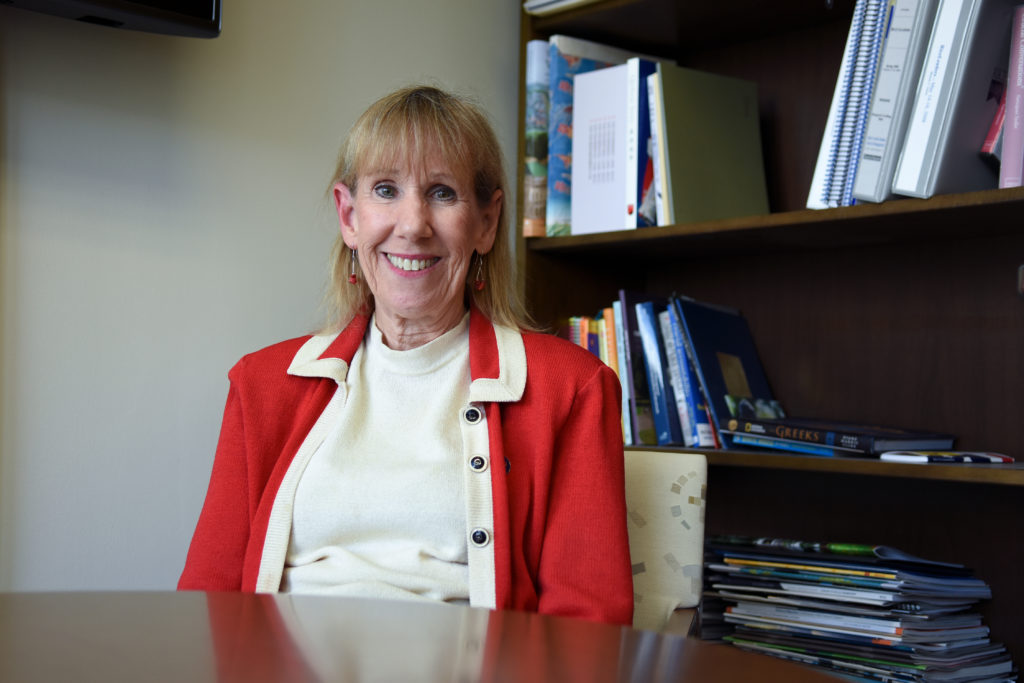Faculty said they’re concerned that budget cuts implemented last year have limited funding in GW Libraries and increased employee burnout.
The Faculty Senate’s library committee released an interim report last month stating that GW Libraries does not have enough staff members to help professors plan online courses. The report also found that library staff have needed to pick up additional duties, like managing Gelman Library’s book deliveries and overseeing building maintenance issues, after a shift to a shared services model in facilities, events and communications.
Geneva Henry, the dean of Libraries and Academic Innovation, said library staff picked up additional responsibilities under the shared services model, like scanning book chapters for professors and other library patrons. She said GW Libraries has needed staff members, especially instructional designers, to “meet the demand” of planning and developing new online courses.
“We still have vacant positions throughout LAI, and we hope to be able to fill them in the upcoming year,” she said in an email.
Henry declined to say whether officials are concerned about employee burnout in light of these additional responsibilities.
Scott Pagel, the associate dean for information services and the director of the Jacob Burns Law Library, said the law library has still been able to provide “outstanding service” to law students and faculty despite the pandemic’s limitations.
“The law library services for students, faculty and staff have not been impacted at all by the recent mitigation efforts (reductions in force and furloughs),” he said in an email.
Pagel said officials had considered reorganizing departments within the law library before the pandemic. He said while the need for budget mitigation efforts increased the urgency for such reorganization, many of the changes would have happened in the future anyway.
Pagel said GW Law officials saw “no alternatives” to eliminating positions or furloughing staff members in the law library.
“Over the past 10 years, the collection budget of the law library has been reduced by over $1 million to address the budget needs of the law school in the wake of the recession,” he said. “The decisions, though difficult, were made carefully to preserve the subscriptions and other services critical to the research needs of the faculty and students of a top law school.”
Anne Linton, the director of the Himmelfarb Health Sciences Library, said budget cuts have required officials to cancel subscriptions to materials in the library’s databases and serials collection. She said officials considered factors like the subject area and cost-per-use for the cancellations.
“Selections were carefully reviewed to ensure that no one subject area was hit disproportionately,” she said in an email.
GW Libraries staff moved offerings like tutoring programs and academic success workshops online in preparation for the fall semester.
Harald Griesshammer, the chair of the senate’s libraries committee and an associate professor of physics, said GW Libraries was already operating below the budget it should have prior to the pandemic after a round of budget cuts in 2016. He said library staff members have struggled to get additional funding during the pandemic so they can increase offerings to help faculty learn how to teach classes in an “efficient” way online.
Griesshammer said officials only made cuts to subscriptions for publications, in subjects like clinical and public health, that faculty did not express a “real demonstrated need” for. He said many members of the libraries committee felt officials should continue to prioritize keeping staff positions instead of saving the libraries’ subscriptions.
“My sense of the committee actually was that the committee would rather see maintaining the presence level of librarians and staff than cutting that and would rather see cuts to the collection,” he said. “And when you let people go, you let experience go.”
Griesshammer added that some are concerned about staff burnout, given the increased reliance on their services this year in addition to the threat of layoffs last year.
“None of them must have gotten any sleep for at least three months,” he said. “They did an amazing job, they did a ton of seminars, they did a ton of workshops, they provided so much information. It’s fantastic, but they did all of this with a staffing that was not adequate to the job that they were actually doing.”
Holly Dugan, an associate professor of English and a member of the libraries committee, said the libraries staff members are “essential” to GW’s core mission of student excellence in teaching and faculty research.
“For us to achieve our academic mission, we need our cutting edge research library for our students to be able to pursue the research that will help change the world,” she said. “They need to have tremendous access to collections but also the library staff who understand and can shepherd that.”
Dugan said the budget cuts are not only affecting academic resources of the libraries but the library facilities as well. She said Gelman Library has “profound” heating, ventilation and air conditioning issues that leave librarians having to fill in for facility jobs.
“We’re going to need to see is an investment both in the staff and the facility structure itself of the libraries,” she said.
Max van Balgooy, an assistant professor of museum studies and a member of the libraries committee, said cuts to the libraries’ staff and resources have made it “difficult” to support the level of scholarship and excellence the facilities have had in previous years. He said all of the services the libraries usually provide have to be “rethought,” like the number of digital journals and book subscriptions available for students.
“When people often think about libraries, they just think about the books on the shelves, but there’s so much more that libraries provide,” van Balgooy said.










